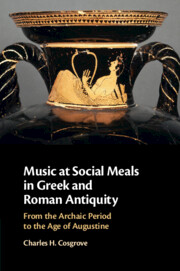Book contents
- Music at Social Meals in Greek and Roman Antiquity
- Music at Social Meals in Greek and Roman Antiquity
- Copyright page
- Dedication
- Contents
- Figures
- Glossary of Musical Instruments
- Abbreviations
- Introduction The Topic and the Sources
- Chapter 1 Sympotic Scenes and Songs
- Chapter 2 The Gentleman’s Lyre
- Chapter 3 Hellenistic Evolutions
- Chapter 4 Poets and Musicians at Upper-Class Greek Banquets
- Chapter 5 Music and Elite Dining in the Roman Age
- Chapter 6 Music at the Social Recreations of the Lower Classes
- Chapter 7 Music at the Suppers and Feasts of the Jewish People
- Chapter 8 Music at Christian Social Meals
- Chapter 9 Purposes and Pleasures
- Bibliography
- Index Locorum
- Subject Index
Chapter 8 - Music at Christian Social Meals
Published online by Cambridge University Press: 18 November 2022
- Music at Social Meals in Greek and Roman Antiquity
- Music at Social Meals in Greek and Roman Antiquity
- Copyright page
- Dedication
- Contents
- Figures
- Glossary of Musical Instruments
- Abbreviations
- Introduction The Topic and the Sources
- Chapter 1 Sympotic Scenes and Songs
- Chapter 2 The Gentleman’s Lyre
- Chapter 3 Hellenistic Evolutions
- Chapter 4 Poets and Musicians at Upper-Class Greek Banquets
- Chapter 5 Music and Elite Dining in the Roman Age
- Chapter 6 Music at the Social Recreations of the Lower Classes
- Chapter 7 Music at the Suppers and Feasts of the Jewish People
- Chapter 8 Music at Christian Social Meals
- Chapter 9 Purposes and Pleasures
- Bibliography
- Index Locorum
- Subject Index
Summary
Chapter 8 is an account of music-making at Christian social meals over the course of the first four centuries of the Common Era. Topics include musical activities at community suppers, private Christian dinner parties, and martyr festivals, as well as ways in which certain Christian writers saw a parallel between singing by turns at Christian social meals and the customs of classical Greeks. The earliest form of Christian music was the self-composed song or hymn, whose setting was the community supper and private Christian dinner party. In time, biblical psalms were taken up as part of the individual Christian’s song repertoire for social meals and prayer gatherings. During the third and fourth centuries, personal hymnody was largely displaced by psalmody. Meanwhile, differing preferences and moral sensibilities among Christians, typically with overtones of class, troubled inner church relations over musical recreations in both church and nonchurch social settings.
Keywords
- Type
- Chapter
- Information
- Music at Social Meals in Greek and Roman AntiquityFrom the Archaic Period to the Age of Augustine, pp. 306 - 339Publisher: Cambridge University PressPrint publication year: 2022

